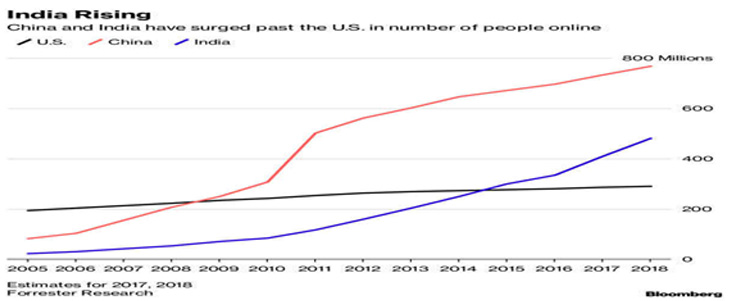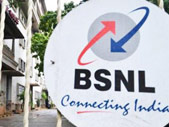|
|
74% Indians believe their skills are in demand: LinkedIn study
 Expressing strong desire for entrepreneurship, India is the most confident amongst nine countries surveyed by LinkedIn recently in achieving career advancement.
Some 74 per cent Indians believe their skills are very much in demand in today’s job market, according to the study, while 68 per cent Indians feel that their skills are easily transferable to other industries. Expressing strong desire for entrepreneurship, India is the most confident amongst nine countries surveyed by LinkedIn recently in achieving career advancement.
Some 74 per cent Indians believe their skills are very much in demand in today’s job market, according to the study, while 68 per cent Indians feel that their skills are easily transferable to other industries.
Much like the rest of APAC, the study found Indians consider career advancement as their main opportunity, with the high confidence (at 77 per cent) indicative of the high-potential jobs market in India.
The entrepreneurship spirit in India, fuelled by the government’s start-up schemes and campaigns, also came through among top opportunities expressed by people in the study.
In India, the third largest start-up economy in the world, starting one’s own business (at 13 per cent) is seen as one of the top three opportunities on the LinkedIn Opportunity Index. People in other developing economies, like Indonesia (at 34 per cent) and the Philippines (at 29 per cent), also expressed a strong desire for entrepreneurship.
The study showed India taking the second spot on the Index behind Indonesia, among markets that are more confident in gaining access to and pursuing opportunities.
However, more developed markets such as Japan, Hong Kong and Australia trailed on the Index, as people in these markets expressed concerns over economic outlook, and generally felt more cautious about their chances of achieving success with opportunities relevant to them.
Apart from studying India’s perception of opportunity, the study also looked at obstacles. Quality of education emerged as a chief concern for India (15 per cent), with people relying heavily on education to base a career decision (84 per cent), highest amongst all APAC countries, the study showed.
The research surveyed more than 11,000 respondents in nine markets in the Asia Pacific region — India, Australia, Chinese Mainland, Hong Kong, Indonesia, Japan, Malaysia, the Philippines, and Singapore.
Olivier Legrand, Managing Director, Asia Pacific, LinkedIn, said in a statement: “The growing workforce in the region (APAC) is a key asset that, if harnessed effectively, is going to continue to drive the economies. Over time, by tracking people’s perception of opportunity and the barriers they face, we hope we can continue to facilitate more of a balance between demand and supply in the opportunity marketplace.” (Source: The Hindu BusinessLine)
|
Telecom companies urge TRAI to make 4G more affordable
 Telecom companies have urged the regulator to make 4G airwaves more affordable and unveil a long-term road map of the periodicity of auctions to provide clarity on spectrum availability and discourage irrational bidding. Top executives of Vodafone Idea, Bharti AirtelNSE 0.72 %, Reliance Jio Infocomm and state-run Bharat Sanchar Nigam Ltd. and Mahanagar Telephone Nigam LtdNSE 0.78 %. met Telecom Regulatory Authority of India Chairman RS Sharma on Wednesday. They sought an early reduction in the starting price of airwaves across the 900 MHz, 800 MHz and 1800 MHz bands to ensure there is enough money left to invest in broadband network rollouts, a person aware of the discussions said. Telecom companies have urged the regulator to make 4G airwaves more affordable and unveil a long-term road map of the periodicity of auctions to provide clarity on spectrum availability and discourage irrational bidding. Top executives of Vodafone Idea, Bharti AirtelNSE 0.72 %, Reliance Jio Infocomm and state-run Bharat Sanchar Nigam Ltd. and Mahanagar Telephone Nigam LtdNSE 0.78 %. met Telecom Regulatory Authority of India Chairman RS Sharma on Wednesday. They sought an early reduction in the starting price of airwaves across the 900 MHz, 800 MHz and 1800 MHz bands to ensure there is enough money left to invest in broadband network rollouts, a person aware of the discussions said.
The Trai boss said the regulator would engage in a holistic consultation process with the industry next year on spectrum issues and look at how reserve prices are assessed. However, he is said to have clarified that the deliberations would not affect Trai’s recommendations in August on the pricing of 4G and 5G spectrum for the next sale, which the government is yet to finalise.
Sharma said the regulator has received “suggestions on a host of spectrum-related issues, including policy around future auctions, reserve price valuation methodology and matters linked to leasing, trading and surrendering of airwaves.”
The discussions with Sharma were open and constructive and related to spectrum issues, implementation of the National Digital Communications Policy 2018, opening up of new technology areas and challenges in setting up telecom infrastructure, P Balaji, chief regulatory & corporate affairs officer at Vodafone Idea who participated in the meeting, told ET.
“The telecom regulator conducted a transparent discussion on the opportunities and challenges for the telecom sector and we look forward to actively working and supporting the government and the regulator’s digital agenda,” Balaji said.
The executives are said to have reiterated their call for early rationalisation of hefty telecom levies — about Rs 32 of every Rs 100 they get goes to the government — especially when the sector continues to reel under almost Rs 8 lakh crore of debt and continuing price wars. They urged the regulator to suggest ways to speed up right-of-way approvals to achieve broadband connectivity at 50 Mbps speed to all Indians by 2022, as outlined in the new telecom policy.
Right of way refers to the legal right to set up network infrastructure such as towers and optic fibre cables along a specific route. (Source: Economic Times)
|
NASSCOM raises concerns over US govt’s H-1B visa proposal
 Nasscom has raised concerns over the US government’s latest proposal that will require H-1B visa-seeking firms to electronically register their petitions in advance, saying this will lead to “uncertainties” and could put US jobs at risk. The IT industry body, in a statement, said it will carefully review the 139-page proposal and evaluate its implications for US companies and the economy, and then submit comments. Nasscom has raised concerns over the US government’s latest proposal that will require H-1B visa-seeking firms to electronically register their petitions in advance, saying this will lead to “uncertainties” and could put US jobs at risk. The IT industry body, in a statement, said it will carefully review the 139-page proposal and evaluate its implications for US companies and the economy, and then submit comments.
The Trump administration on Friday proposed major changes to the H-1B application process, aimed at awarding the popular American work visa to the most skilled and highest paid foreign workers.
“There is not much time between now and when the next H-1B lottery season opens in April. Companies have already begun assessing their needs and planning their submissions for next year, so we are concerned about the uncertainties that could arise as the government seeks to implement another major change in the H-1B process during that timeframe,” Nasscom said in a statement.
It added that it will review the proposal before submitting comments and “take other actions as appropriate to best ensure that the process makes sense, is fair, and does no harm.”
The US Department of Homeland Security said public comments on the proposed rule may be submitted starting December 3, when the proposed rule is published in the US Federal Register, and must be received on or before January 2.
“To the extent US policy makes it more difficult and costlier for global IT service companies to provide their expertise in the US, it will weaken the US companies that depend on them to help fill their skills gaps. Contrary to what is intended, this action could put US jobs at risk and create pressure to send more IT work abroad, rather than performing it in the US,” NASSCOM pointed out.
Under the new rule, the US Citizenship and Immigration Services (USCIS) would also reverse the order by which it selects H-1B petitions under the H-1B cap and the advanced degree exemption. (Source: The Hindu BusinessLine)
|
How Facebook uses 'WhatsApp phones' to tap next emerging market
 Facebook Inc., WhatsApp’s parent, and India’s richest man, who started Reliance Jio, are teaming up to draw hordes of customers with cheap phones, rock-bottom rates and handy messaging services.
Facebook Inc., WhatsApp’s parent, and India’s richest man, who started Reliance Jio, are teaming up to draw hordes of customers with cheap phones, rock-bottom rates and handy messaging services.
One recent afternoon in the Indian city of Pune, a 35-year-old mason named Om Prakash Gaekwad gets a crash course in technology. He watches a street-corner skit explaining the virtues of WhatsApp’s messaging service and Reliance Jio’s wireless network. He then climbs aboard a truck to find out how to set them up. Half an hour later, he’s made up his mind: He’ll upgrade to a new phone so he can negotiate masonry rates on WhatsApp -- and let his six-year-old play mobile games.
Such pitches -- part tutorial, part kitsch -- are boosting web adoption in what is already the world’s fastest-growing major internet market. Facebook Inc., WhatsApp’s parent, and India’s richest man, who started Reliance Jio, are teaming up to draw hordes of customers with cheap phones, rock-bottom rates and handy messaging services. Facebook’s role in all this is so central that, in rural regions, handsets with Net access are dubbed “WhatsApp phones.”
The two companies are building a massive user base that will boost their own fortunes. At the same time, they’re creating the foundation on which business like online retail, digital payments and food delivery can be built. Reliance Jio and WhatsApp wouldn’t comment directly on future plans, but experts see more collaboration as inevitable.
“It’s a natural alliance because it gives WhatsApp access to tens of millions of new customers through Reliance Jio,” said Nandan Nilekani, technology investor and co-founder of tech outsourcing giant Infosys Ltd. In turn, Reliance gets a lift because millions of neophytes see WhatsApp as the first step in entering the rest of the Internet.
India already has 480 million internet users -- about 75 percent more than the U.S. and second only to China. That figure is projected to grow to 737 million by 2022, according to Forrester Research Inc. “The next 500 million users are yet to be captured,” said Satish Meena, a forecast analyst at Forrester.
 Facebook, reeling from crisis after crisis in the U.S., faces challenges in Asia too, such as criticism that it hasn’t done enough to combat the spread of violence in Myanmar. In India, its Free Basics, which offers a minimalist web for emerging markets, was banned for violating net neutrality, while WhatsApp has been used to circulate fake videos and rumors that have led to dozens of lynchings. The government has threatened legal action if the company doesn’t do more to clean up the problems. Facebook, reeling from crisis after crisis in the U.S., faces challenges in Asia too, such as criticism that it hasn’t done enough to combat the spread of violence in Myanmar. In India, its Free Basics, which offers a minimalist web for emerging markets, was banned for violating net neutrality, while WhatsApp has been used to circulate fake videos and rumors that have led to dozens of lynchings. The government has threatened legal action if the company doesn’t do more to clean up the problems.
The scandals have Facebook’s stock on pace for its worst annual performance since 2012, the year it made its public debut.
Yet India is evolving into perhaps its most promising opportunity. The country is already WhatsApp’s biggest market, with more than 200 million users -- so important that Chris Daniels has visited twice since becoming CEO in May. The messaging service is free to use, but Facebook charges businesses to communicate on the platform and is expected to introduce advertising. WhatsApp will become more crucial to Facebook’s bottom line as the social network matures.
“A lot of our growth is coming from markets in Asia; our top growth countries were India, Indonesia and the Philippines,” David Wehner, chief financial officer, said on the most recent earnings call.
Facebook’s recent momentum in India stems from its alliance with Mukesh Ambani, chief of the conglomerate Reliance Industries. In a seismic shake-up of the telecom industry, Ambani invested $35 billion to launch the country’s most advanced wireless network two years ago. He offered free voice calls and bargain-basement digital connectivity through inexpensive feature phones across India, appealing to those fazed by smartphones. Millions of impoverished Indians were yanked into the digital age almost overnight. Most of Ambani’s rivals -- including his own brother -- were quickly driven into irrelevance.
In just two years, his network has grown to more than 250 million subscribers, more than AT&T Inc. or Verizon Communications Inc. Ambani has aspirations to use this sprawling base to build his digital empire: He’s piloting a digital payments bank, moving into television and movies and exhibiting Bezos-like ambitions to dominate all aspects of e-commerce.
The pitch in Pune shows how Facebook and Reliance Jio operate. In the city’s teeming Kondhwa Market, a team of traveling performers dressed in green WhatsApp T-shirts reprise their skit throughout the day. It opens with a rowdy game of cricket, then friends share the excitement of taking selfies and creating WhatsApp friends’ groups. “Dhoom macha rakhi hai,” WhatsApp has created a big stir, said one performer.
There is a dark side, another points out. Forwarded videos can incite fear and hatred, shattering social unity. The performers warn about identifying fake messages, and quitting groups created by strangers. After government criticism, WhatsApp limits forwarding to five people per message.
As the skit nears its end, Mitesh Patil stands inside the open truck, ready to field questions from visitors. The chatty 19-year-old is taking a break from college to work as a “WhatsApp ambassador.” Aside from queries on how to download WhatsApp, he is asked about the JioPhone’s price and whether an old feature phone can be exchanged for new device. He directs them to Reliance stores nearby.
“Many people who can’t read and have no idea how an internet-ready phone works, came here asking to buy one and download WhatsApp,” says Patil. “An internet-connected mobile phone has become a basic necessity in India.”
As the sun sets over Pune, the crew takes their role-playing tutorial across the city to Handewadi Road, a busy warren of streets lined with middle-class homes. Within minutes, a crowd descends on the van. Among them is Sunita Kamble, a beautician who provides doorstep service. She’s been on the Jio network for 18 months, watching YouTube videos on body polishing, haircuts and makeup on her battered Oppo phone. “I saved 50,000 rupees by learning via the internet instead of taking a make-up course,” says the 37-year-old, with tunic pants, salwar kameez and a traditional bindi dot on her forehead.
Kamble is now ready for a big step: learning English and brushing up her cooking skills on a new JioPhone she intends to buy. “I can message my clients and schedule all my appointments on WhatsApp,” she said.
Still, there’s a note of caution in the air. Many customers leap from poverty and isolation to a digital age where messages can inflame religious and cast prejudices. That afternoon, the skit ends with a message in Hindi that plays on the word Jio, which means “to live,” and urges “respect and honor.” (Source:ETTelecom)
|
BSNL employee unions defer strike
 The employee unions met Telecom Secretary Aruna Sundararajan Sunday and observed improvement in some of the issues. All employee unions of BSNLSunday decided to defer their indefinite strike to December 10 if they fail to resolve issues in the proposed meeting with Telecom Minister Manoj Sinha. The employee unions met Telecom Secretary Aruna Sundararajan Sunday and observed improvement in some of the issues. All employee unions of BSNLSunday decided to defer their indefinite strike to December 10 if they fail to resolve issues in the proposed meeting with Telecom Minister Manoj Sinha.
The employee unions met Telecom Secretary Aruna Sundararajan Sunday and observed improvement in some of the issues that they have been raising, such as allotment of 4G spectrum, pension revision and payment of pension contribution by BSNL as per the government rule.
All Unions and Associations of BSNL (AUAB), however, said in a statement that they were not convinced with the reply of the secretary in respect to their demand on third pay revision.
The strike was earlier proposed to start from December 3.
"Under these circumstances, with the view to ensure an opportunity for having a discussion with the Hon'ble Minister of State for Communications, the AUAB has decided to defer the indefinite strike for one week," the statement said.
BSNL unions have been demanding allocation of 4G spectrum to the public sector firm so that it is able to compete in the market and keep up the market share.
The employees are also demanding wage revision as per recommendations of 2nd and 3rd pay revision committee.
"In case a fruitful settlement does not arise in the meeting with the Hon'ble Minister of State for Communications, the indefinite strike will start from 00:00 hours on 10-12-2018," AUAB said. (Source: ETTelecom)
|
 Expressing strong desire for entrepreneurship, India is the most confident amongst nine countries surveyed by LinkedIn recently in achieving career advancement.
Some 74 per cent Indians believe their skills are very much in demand in today’s job market, according to the study, while 68 per cent Indians feel that their skills are easily transferable to other industries.
Expressing strong desire for entrepreneurship, India is the most confident amongst nine countries surveyed by LinkedIn recently in achieving career advancement.
Some 74 per cent Indians believe their skills are very much in demand in today’s job market, according to the study, while 68 per cent Indians feel that their skills are easily transferable to other industries.

 Telecom companies have urged the regulator to make 4G airwaves more affordable and unveil a long-term road map of the periodicity of auctions to provide clarity on spectrum availability and discourage irrational bidding. Top executives of Vodafone Idea, Bharti AirtelNSE 0.72 %, Reliance Jio Infocomm and state-run Bharat Sanchar Nigam Ltd. and Mahanagar Telephone Nigam LtdNSE 0.78 %. met Telecom Regulatory Authority of India Chairman RS Sharma on Wednesday. They sought an early reduction in the starting price of airwaves across the 900 MHz, 800 MHz and 1800 MHz bands to ensure there is enough money left to invest in broadband network rollouts, a person aware of the discussions said.
Telecom companies have urged the regulator to make 4G airwaves more affordable and unveil a long-term road map of the periodicity of auctions to provide clarity on spectrum availability and discourage irrational bidding. Top executives of Vodafone Idea, Bharti AirtelNSE 0.72 %, Reliance Jio Infocomm and state-run Bharat Sanchar Nigam Ltd. and Mahanagar Telephone Nigam LtdNSE 0.78 %. met Telecom Regulatory Authority of India Chairman RS Sharma on Wednesday. They sought an early reduction in the starting price of airwaves across the 900 MHz, 800 MHz and 1800 MHz bands to ensure there is enough money left to invest in broadband network rollouts, a person aware of the discussions said.
 Nasscom has raised concerns over the US government’s latest proposal that will require H-1B visa-seeking firms to electronically register their petitions in advance, saying this will lead to “uncertainties” and could put US jobs at risk. The IT industry body, in a statement, said it will carefully review the 139-page proposal and evaluate its implications for US companies and the economy, and then submit comments.
Nasscom has raised concerns over the US government’s latest proposal that will require H-1B visa-seeking firms to electronically register their petitions in advance, saying this will lead to “uncertainties” and could put US jobs at risk. The IT industry body, in a statement, said it will carefully review the 139-page proposal and evaluate its implications for US companies and the economy, and then submit comments.
 Facebook Inc., WhatsApp’s parent, and India’s richest man, who started Reliance Jio, are teaming up to draw hordes of customers with cheap phones, rock-bottom rates and handy messaging services.
Facebook Inc., WhatsApp’s parent, and India’s richest man, who started Reliance Jio, are teaming up to draw hordes of customers with cheap phones, rock-bottom rates and handy messaging services.
 Facebook, reeling from crisis after crisis in the U.S., faces challenges in Asia too, such as criticism that it hasn’t done enough to combat the spread of violence in Myanmar. In India, its Free Basics, which offers a minimalist web for emerging markets, was banned for violating net neutrality, while WhatsApp has been used to circulate fake videos and rumors that have led to dozens of lynchings. The government has threatened legal action if the company doesn’t do more to clean up the problems.
Facebook, reeling from crisis after crisis in the U.S., faces challenges in Asia too, such as criticism that it hasn’t done enough to combat the spread of violence in Myanmar. In India, its Free Basics, which offers a minimalist web for emerging markets, was banned for violating net neutrality, while WhatsApp has been used to circulate fake videos and rumors that have led to dozens of lynchings. The government has threatened legal action if the company doesn’t do more to clean up the problems. The employee unions met Telecom Secretary Aruna Sundararajan Sunday and observed improvement in some of the issues. All employee unions of BSNLSunday decided to defer their indefinite strike to December 10 if they fail to resolve issues in the proposed meeting with Telecom Minister Manoj Sinha.
The employee unions met Telecom Secretary Aruna Sundararajan Sunday and observed improvement in some of the issues. All employee unions of BSNLSunday decided to defer their indefinite strike to December 10 if they fail to resolve issues in the proposed meeting with Telecom Minister Manoj Sinha.






